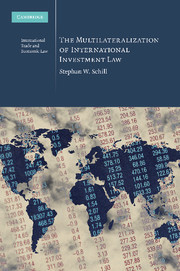Description
The Multilateralization of International Investment Law
Cambridge International Trade and Economic Law Series
Author: Schill Stephan W.
The book argues that international investment law is a structured body of law based on uniform principles of investment protection.
Language: English
Subject for The Multilateralization of International Investment Law:
Approximative price 35.47 €
In Print (Delivery period: 14 days).
Add to cart
The Multilateralization of International Investment Law
Publication date: 01-2014
Support: Print on demand
Publication date: 01-2014
Support: Print on demand
Approximative price 129.87 €
Subject to availability at the publisher.
Add to cart
The multilaterization of international investment law
Publication date: 08-2009
490 p. · 15.2x23.1 cm · Hardback
Publication date: 08-2009
490 p. · 15.2x23.1 cm · Hardback
Description
/li>Contents
/li>Biography
/li>
Attempts at developing a theory of international investment law are complicated by the fact that this field of international law is based on numerous, largely bilateral treaties and is implemented by arbitral panels established on a case-by-case basis. This suggests a fragmented and chaotic state of the law, with different levels of protection depending on the sources and targets of foreign investment flows. This book, however, forwards the thesis that international investment law develops, despite its bilateral form, into a multilateral system of law that backs up the functioning of a global market economy based on converging principles of investment protection. In discussing the function of most-favored-nation clauses, the possibilities of treaty-shopping and the impact of investor-State arbitration with its intensive reliance on precedent and other genuinely multilateral approaches to treaty interpretation, it offers a conceptual framework for understanding the nature and functioning of international investment law as a genuinely multilateral system.
1. Introduction: globalization and international investment law; 2. The dynamics of multilateralism and bilateralism in international investment relations; 3. Treaty negotiation and multilateralization of international investment law; 4. Multilateralization through most-favoured-nation treatment; 5. Multilateralization and corporate structuring; 6. Multilateral enforcement of international investment law; 7. Multilateralization through interpretation: producing and reproducing coherence in investment jurisprudence; 8. Conclusion: multilateralization-universalization-constitutionalization.
Stephan W. Schill is a Senior Research Fellow at the Max Planck Institute for Comparative Public Law and International Law in Heidelberg. Formerly he assisted the Honorable Charles N. Brower of 20 Essex Street Chambers, London, in international commercial and investor-State arbitrations under various arbitral rules and clerked at the International Court of Justice. He is admitted to the bars in Germany and New York.
© 2024 LAVOISIER S.A.S.
These books may interest you

The Asian Turn in Foreign Investment 121.51 €



